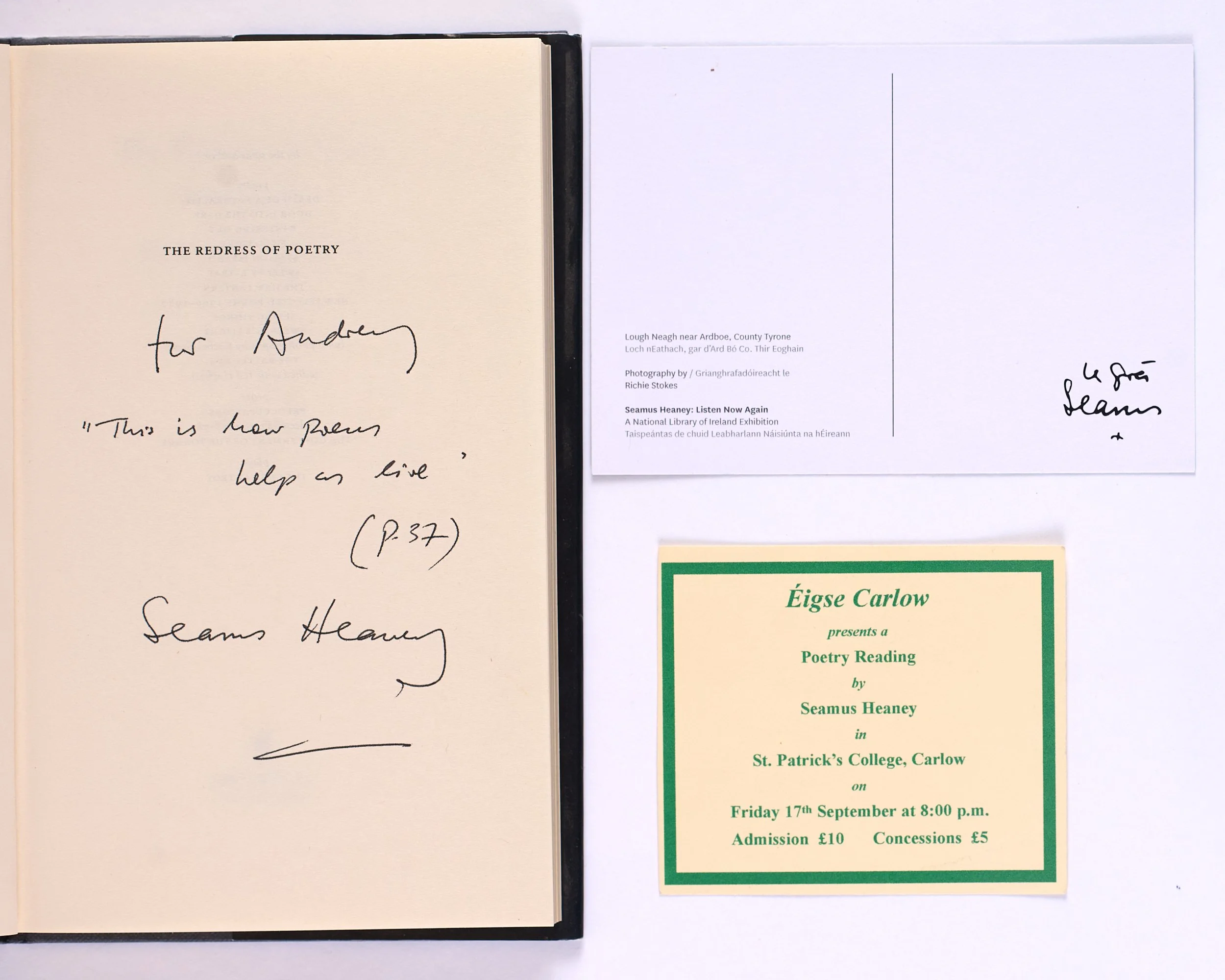 Image 1 of 2
Image 1 of 2

 Image 2 of 2
Image 2 of 2



The Redress of Poetry. Oxford Lectures
HEANEY, Seamus
The Redress of Poetry. Oxford Lectures.
London: Faber and Faber, 1995
8vo., dark grey publisher’s boards, spine lettered in pale yellow with publisher’s device to head; together in the unclipped pictorial dustwrapper (£15.99 to front flap) featuring a woodcut taken from the collection at the Beinecke Library; pp. [x], ix-xviii, 213, [vii]; a near-fine copy, just one small white mark to front boards and mild compression to spine ends; the wrapper with just a little light shelf wear and rubbing to edges; tiny abrasion to head of spine; else near-fine.
First edition. This copy inscribed by Heaney to the half title “For Audrey / ‘This is how poems / help us live’ / (p.37) / Seamus Heaney”. Loosely laid in are also a series of ephemeral items, including a ticket to the Éigse Carlow Poetry Reading by Seamus Heaney, which was held in St. Patrick’s College, Carlow on the 17th September in an unspecified year, a postcard from the National Library of Ireland with Heaney’s facsimile signature; and numerous newspaper clippings reviewing the book and commenting on his recent prize win, with extracts from the Independent and The Observer. The quotation is taken directly from one of Heaney’s own poems, reprinted on page 37, the full stanza of which reads:
This is how poems help us live.
They match the meshes in the sieve
Life puts us through; they take and give
Our proper measure
And prove themselves most transitive
When they give pleasure
A collection of lectures which were given by Heaney while he was Professor of Poetry at Oxford from 1989 to 1994, in which he attempts to prove that, in his own words, ‘poetry is strong enough to help’. His use of examples is diverse and eclectic; ranging from Dylan Thomas to Elizabeth Bishop, and Christopher Marlowe’s ‘Hero and Leander’ to Oscar Wilde’s ‘The Ballad of Reading Gaol’. He also discusses his own work, and together the lectures provide his attempts to discover the ‘purpose’ of poetry, and the place of Irish poetry, specifically, within that framework.
A lovely inscribed example.
HEANEY, Seamus
The Redress of Poetry. Oxford Lectures.
London: Faber and Faber, 1995
8vo., dark grey publisher’s boards, spine lettered in pale yellow with publisher’s device to head; together in the unclipped pictorial dustwrapper (£15.99 to front flap) featuring a woodcut taken from the collection at the Beinecke Library; pp. [x], ix-xviii, 213, [vii]; a near-fine copy, just one small white mark to front boards and mild compression to spine ends; the wrapper with just a little light shelf wear and rubbing to edges; tiny abrasion to head of spine; else near-fine.
First edition. This copy inscribed by Heaney to the half title “For Audrey / ‘This is how poems / help us live’ / (p.37) / Seamus Heaney”. Loosely laid in are also a series of ephemeral items, including a ticket to the Éigse Carlow Poetry Reading by Seamus Heaney, which was held in St. Patrick’s College, Carlow on the 17th September in an unspecified year, a postcard from the National Library of Ireland with Heaney’s facsimile signature; and numerous newspaper clippings reviewing the book and commenting on his recent prize win, with extracts from the Independent and The Observer. The quotation is taken directly from one of Heaney’s own poems, reprinted on page 37, the full stanza of which reads:
This is how poems help us live.
They match the meshes in the sieve
Life puts us through; they take and give
Our proper measure
And prove themselves most transitive
When they give pleasure
A collection of lectures which were given by Heaney while he was Professor of Poetry at Oxford from 1989 to 1994, in which he attempts to prove that, in his own words, ‘poetry is strong enough to help’. His use of examples is diverse and eclectic; ranging from Dylan Thomas to Elizabeth Bishop, and Christopher Marlowe’s ‘Hero and Leander’ to Oscar Wilde’s ‘The Ballad of Reading Gaol’. He also discusses his own work, and together the lectures provide his attempts to discover the ‘purpose’ of poetry, and the place of Irish poetry, specifically, within that framework.
A lovely inscribed example.

